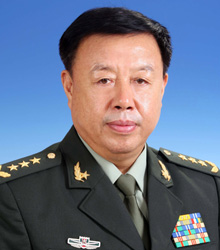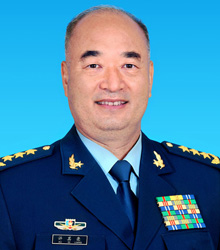| CPC Military Appointees
 |
 |
|
Fan Changlong |
Xu Qiliang |
Fan Changlong and Xu Qiliang have been appointed Vice Chairmen of the Central Military Commission of the Communist Party of China (CPC) at the Seventh Plenary Session of the 17th CPC Central Committee on November 4. Vice President Xi Jinping, and two generals—Guo Boxiong and Xu Caihou—are also Vice Chairmen of the Central Military Commission of the CPC.
Fan was born in Dandong, northeast China's Liaoning Province, in 1947. He joined the People's Liberation Army (PLA) and joined an artillery regiment in the Shenyang Military Command in 1969. He became the commander of the regiment in 1982. He was appointed chief of staff of the Shenyang Military Command in 2000 and commander of the Jinan Military Command in 2004.
Born in 1950 in Linqu, east China's Shandong Province, Xu joined the PLA in 1966. He graduated from the Fifth Aviation School of the PLA Air Force and became a pilot in 1969. Xu served as deputy commander of the 26th Division of the Air Force and later served as commander from 1980 to 1984. He became chief of staff of the PLA Air Force in 1994. He served as deputy commander of the PLA's Shenyang Military Area Command from 1999 to 2004. Xu was appointed the PLA's deputy chief of general staff in 2004 and commander of the PLA Air Force in 2007.
Waste Disposal
The Chinese Government has released guidelines ensuring all dangerous wastes produced by major licensed units at or above municipal levels will be safely disposed of by 2015.
The document, which was made public on November 5, said that licensed waste-producing units safely disposed of 8.4 million tons of dangerous wastes in 2010, up 180 percent from 2006.
It urged strengthening control of sources of harmful waste, supervising all waste-processing procedures as well as integrating legal, administrative, economic and technological measures to stem illegal dumping and improve waste treatment capacity.
The guideline came after a series of waste dumping scandals affecting local environments and people's health. It set a goal of having 90 percent of waste producers and 95 percent of waste processors at all levels to meet government management standards by 2015.
In addition, the document set down several key missions including surveying dangerous waste, developing industries to utilize recyclable waste, and boosting capacities to safely dispose of heavy metals and medical waste.
China's rapid urbanization will greatly increase its number of middle-class people to 600 million and support an economic growth between 7 and 8 percent annually by 2020, a government think tank predicted.
The continued urbanization and the increase in middle-class consumers will spur investment demand by at least 40 trillion yuan ($6.41 trillion) over the next 10 years, said the China Institute for Reform and Development in a report released on November 3.
A study by the institute indicated China's urbanization rate reached 51.3 percent in 2011, meaning over half of Chinese population were living in cities and towns last year.
As more farmers are leaving their farmlands and becoming migrant workers in cities and towns, China is expected to have another 200 million migrant workers living in urban areas, said the institute.
The income gap between China's urban and rural residents has narrowed for three consecutive years, the Ministry of Agriculture said on November 1.
Rural residents' per-capita cash income stood at 6,778 yuan ($1,086) in the first three quarters of this year, up 12.3 percent year on year, the ministry said, adding that the growth was 2.5 percentage points higher than that of urban residents.
The urban-rural income ratio was 2.72 to 1, down from 2.77 to 1 in the same period last year, according to the ministry.
The ministry warned that farmers' income growth will slow down due to soaring agricultural production costs.
Moreover, the grim global economic condition will have an impact on migrant workers' wages and weaken government efforts to boost the agricultural sector, it said.
A new system of village-based supervisory committees has been proposed in China to stem emerging misconduct and corruption among local officials and guard against infringement of farmers' interests.
An official document co-publicized on November 5 by 12 central government departments suggested the committees be formed in villages to improve supervision over members of villagers' committees, the autonomous bodies that govern all of a village's public affairs.
According to a copy posted on the website of the Ministry of Civil Affairs, systematic arrangements should be made to improve auditing of village officials' economic responsibilities and hold them accountable.
"No village official should be relieved of accountability because of end of tenure or termination of service, until auditing shows they are clean," said the document.
The Chinese Government has pledged to establish a national basic medical and healthcare system by 2015.
To address high medical costs, the newly released highlights of the 12th Five-Year Plan (2011-15) for healthcare development says that annual medical insurance subsidies for non-working urban residents and rural residents will be raised from about 240 yuan ($38) to 360 yuan ($58) by 2015.
China has a three-tier health insurance scheme, including insurance for urban workers, non-working urbanites and rural residents.
According to the plan, under all three schemes, health insurance can cover as much as 75 percent of total in-patient care expenditures, reducing patients' out-of-pocket spending.
Furthermore, more diseases will be covered by a medical insurance program designed to provide financial aid to seriously ill patients. The program began in June 2010 and covers 20 diseases.
A Chinese court on November 6 sentenced Naw Kham, a drug lord from Myanmar, and three of his subordinates to death for the murder of 13 Chinese sailors on the Mekong River last year.
Another two members of Naw Kham's gang, identified by their Chinese names Zha Bo and Zha Tuobo, respectively received a death sentence with reprieve and eight years in prison, according to a verdict handed down by the Intermediate People's Court of Kunming in southwest China's Yunnan Province. The two Zhas are from Myanmar.
The six suspects, comprised of five people from Myanmar, Thailand and Laos and one stateless suspect, faced charges of intentional homicide, drug trafficking, kidnapping and hijacking or a combination of those criminal offenses. The suspects were ordered by the court to pay compensations totalling 6 million yuan ($960,000).
All six defendants said they will appeal the verdicts. | 